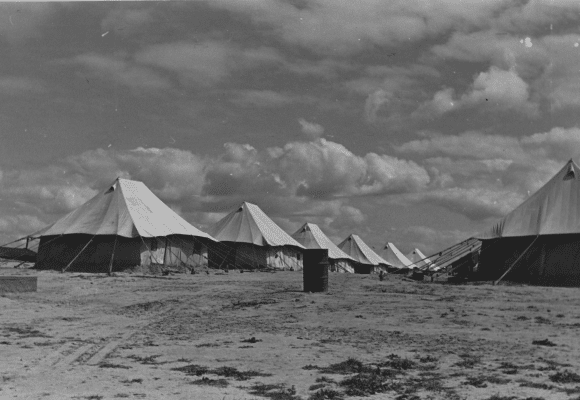.
.
“Remember to Forget, ” a short story by Amadea Tanner, was a short-listed entry in our recently concluded 63rd Short Fiction Contest, and is published with the consent of the author.
.
.
___
.
.
Tents at Nuseirat, southern Palestine, UNRRA’s biggest camp for Greek refugees/via United Nations Relief and Rehabilitation Administration

.
.
Remember to Forget
By Amadea Tanner
.
…..One evening, while travelling with the latest soldier convoy in the vague vicinity of north, the correspondent insisted her companions stop.
…..“What’s the matter?” the driver asked.
…..“Kill the engine,” she commanded, and though she had no authority over him, there was enough in her tone of voice to coerce him to comply.
…..The truck quieted, and there was a moment of strange silence, until a breeze whispered towards them, carrying with it a faint melody. It was a soft sound, quicker than light, lighter than air; a murmur, a whisper, an echo.
…..“Do you hear that?” she asked.
…..“Hardly at all,” the driver admitted. “How in the hell did you hear that before?”
…..“That’s no soldiers’ camp,” she tried to sound matter of fact, but was unable to hide the excitement in her voice. “Will you take me?”
…..“I’ll take you as far as the road goes, but you’re on your own from there.”
…..He did just that, declaring she could meet them again at the soldier’s encampment a few miles up the road if she got there before they left at dawn. They deposited her in a cloud of dust and fumes, and she headed in the direction of the music.
…..It was the first she’d heard in a very long time; she realized it was the one thing she had been missing. She had grown accustomed to the quiet, and hadn’t recognized how empty everything was without music, how forlorn a silent world could be. The one thing distinguishing the living from ghosts was the music they could play and listen and dance to.
…..Through a smattering of trees, the correspondent came upon a camp where people were settling in for the night. As she approached, they eyed her warily, but did not stop her as she stepped beyond the perimeter and into their midst. She looked away from their searching faces, unable to offer them answers to the questions in their eyes. She looked only for the music, and now that she was near enough to hear it with some clarity, it began to fill an emptiness in her heart.
…..But though the music was familiar, when the correspondent came upon the players, they were a sextet of strangers: a triad of guitars, two violins, and an accordion brought to life by men as old as time. They played with the wisdom of prophets around a fire that sucked the light out of the evening sky such that nothing else was so vibrant as their music. The guitar tremolos shimmered like stardust, the violins cried out questions, and the accordion exhaled the answers in a language just beyond comprehension.
…..A group of children sat around the musicians, watching intently, and the correspondent sat herself down among them. Looking up at the players from the ground, she began to feel as though she were kneeling in prayer. She felt something all-powerful pass through her, a chill that lifted the hairs on her arms. This music, at times soft, at others insistent, was something like a battle cry, a declaration, a promise.
…..It was not the same bouncing lilt of a melody she’d heard the street musicians play; exuberant, but in a minor key. This was more haunting, with notes strummed slower that lingered longer and made for a more saturated sound. It was the kind that seeped out of the air and straight into the veins, travelling quickly to the heart. The correspondent couldn’t help gasping a little at the shock of the sensation.
…..She knew not how long she sat there, soaking up the music and the sense of restoration that came with it. It seemed, somehow, that if there was a way to save the world, this was it. She didn’t know how, exactly, but the secret was somewhere, here, in this glorious sound.
…..When the musicians took a break, night had settled and one of the women of the camp came up to the correspondent with a smile.
…..“You like the music,” she said.
…..“It’s like nothing I’ve ever heard.”
…..“They play it every night. I think it helps them to remember, but also to forget.”
…..“Forget?”
…..“It is the way to heal the heart.”
…..“Where have you come from?” the correspondent asked. It was easier than asking what had happened.
…..“That place no longer exists.”
…..The woman turned then to the children and busied herself with rounding them up for an evening meal. This assembly of people was just women and children and men too old to fight, like every other refugee camp the correspondent had passed through. Their young men were out there, somewhere out there in the great beyond, where they were fighting and dying for something that no longer existed.
…..The correspondent may have been lost, even more lost than these people were, but she knew she still had a home to go back to. Though as she left the camp, the music resuming, then fading, in her wake, she could not summon any thoughts of home.
…..Maybe home was like that. It could feel so certain, so indispensable, so long as you were there. But if you left for too long, home became a memory, and with nothing tangible to conjure it, took on the hazy luster of a dream. You only belonged if you were there. Otherwise, it made a gal feel like a ghost.
.
.
___
.
.

Amadea Tanner is a writer whose love of swing dance and music has prompted her to craft many stories set against the backdrop of WWII. You can read her story “Armed Delilahs” by clicking here.
You can find Amadea in the ether @amadea_cadence.
.
___
.
.
Click here to read “Company,” Anastasia Jill’s winning story in the 63rd Jerry Jazz Musician Short Fiction Contest
Click here for details about the upcoming 65th Jerry Jazz Musician Short Fiction Contest
Click here to subscribe to the Jerry Jazz Musician quarterly newsletter (it’s free)
Click here to help support the continuing publication of Jerry Jazz Musician, and to keep it commercial and ad-free (thank you!)
.
.
___
.
.
Jerry Jazz Musician…human produced (and AI-free) since 1999
.
.
.





























